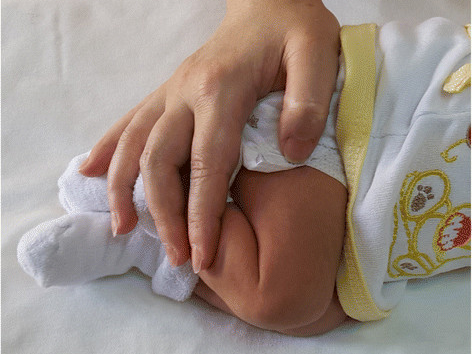The Power of Human Touch
Gentle touch shown to reduce pain.
Newborns suffer from airway suctioning, but careful positioning is likely to help.

The Facts:
Cochrane presented a study of a painful medical procedure in neonates. Many newborns, particularly preterm, cannot breathe very well, so a common procedure, so-called endotracheal suctioning, involves clearing their airways by sucking excessive secretions into a catheter. And, it’s known to be painful, so the recent study looked at what can be done to alleviate suffering, apart from the obvious medications – painkillers and anesthetics.
After analyzing data from 148 neonatal intensive care unit (ICU) patients across four randomized trials, the researchers were moderately certain that so-called facilitated tucking reduces suction-associated pain in neonates on mechanical ventilation. Facilitated tucking is a positioning technique that involves gently bending a baby’s arms and legs, as shown in the image above. A 13–20% change on the pain scale used in these trials is likely to be noticed by health care workers and caregivers alike, and facilitated tucking produced a 14–40% change. There are several instruments for pain assessment in infants, and the one used here, Premature Infant Pain Profile, derives its scoring points from observing the baby’s facial actions, heart rate, and oxygen saturation.
When planning their study, the authors wanted to assess all kinds of non-pharmaceutical treatments, including rocking the baby, skin-to-skin contact, or breastfeeding. It turned out that only gentle touch techniques were appropriately studied in the suctioning context. The researchers also wanted to assess a variety of outcomes, including mortality, nausea, vomiting, or intracranial hemorrhage but ended up looking at just the pain scores because these other outcomes were not reported.
The uneasy side of medicine is that treating hurts sometimes. When it comes to children, pain is a particularly sensitive issue. The uncomfortable truth is that newborn babies experience pain from medical procedures, too. Even worse – that pain is theorized to have an immense impact on brain development, potentially leading to devastating consequences. The new evidence concerning facilitated tucking and windpipe suctioning shows us just how much a gentle human touch can matter.
The Evidence:
- A Cochrane study analyzed data from 148 neonatal ICU patients across 4 randomized trials to see if facilitated tucking (gently bending a baby’s arms and legs) reduces pain in neonates on mechanical ventilation undergoing endotracheal suctioning.
- The scientists found moderate-certainty evidence that facilitated tucking reduces pain by 2.0 to 3.6 points on the Premature Infant Pain Profile scale used. Based on previous studies, a drop of about 1.5 points is likely to be noticeable to some parents, and of 2.3 points to clinicians.
- The researchers wanted to assess other non-pharmaceutical treatments like rocking, skin-to-skin contact, or breastfeeding, but only gentle touch techniques were well-studied for this procedure.
- They also wanted to look at outcomes like mortality, nausea/vomiting, and hemorrhage, but data unavailability forced the researchers to limit analyses to just pain scores.
- This new evidence comes as hopeful news against the uncomfortable truth that medical procedures cause newborns pain, with early-life pain theorized to impact brain development.
The Research:
Notes
- If you want to contract Zheln’s services or simply reach out, do send us an email. We can do anything that touches the realm of health research: from running a hardcore meta-analysis from scratch to publication, through holding an educational tutorial session for health professionals or the public, through speaking at an event or writing for your newspaper. The only thing we don’t provide is medical advice; but, we do provide medical evidence.
- This post was created by a team of researchers and journalists with the help of multiple generative AI tools. Please refer to the video bibliography for more information.
- Full changelog of this page is available.
- The original Zheln whitepaper is available as a preprint.
- Follow Zheln on Threads and Instagram.
- Donations are accepted via GitHub Sponsors.
Citation
Zhelnov P. The Power of Human Touch. Zheln. 2024 Feb 2;3(1):t9e4. URI: https://zheln.com/thread/2024/02/02/1/
| « Previous Post | Next Post » |
Let me know what you think of this article on Twitter @drzhelnov!